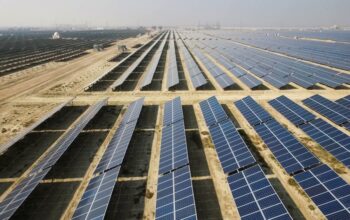The state-owned oil marketing monolith is in the middle of yet another recursion of its resident liquidity crunch, and while it is too big to fail, the government cannot spare enough cash this time. Cue PKR 50 billion in sovereign guarantees to back commercial borrowing.
By Muhammad Ali
ISLAMABAD: Authorities in Pakistan are scrambling to line up PKR 50 billion in sovereign guarantees to keep Pakistan State Oil (PSO), the state-owned petroleum monolith, afloat in the short run.
That PSO needs a bailout (yet again) is hardly news. Weighed down by crippling public sector burdens, the company has been struggling to stay afloat for a while now.
This time it aired an SOS call for the government to provide sovereign guarantees for commercial borrowing in the range of PKR 50 billion to PKR 100 billion urgently in order to avoid default on its foreign obligations.
Warming up to its call on necessity, the Economic Coordination Committee (ECC) of the Cabinet promptly has approved PKR 50 billion in sovereign guarantees to help PSO borrow the requisite commercial financing.
The PSO is a major petroleum marketing and distribution player in Pakistan. It has a network of 3,689 petroleum filling stations, out of which 3500 outlets serve the public retail sector and 189 outlets serve wholesale bulk customers.
Its financial woes are rooted in Pakistan’s mammoth energy sector circular debt. A major component of its overdue receivables owed by the public sector is its role in Liquified Natural Gas (LNG) imports.
The PSO imports LNG in the country to meet the country’s clean energy needs. Re-gasified LNG (RLNG) is predominantly purchased by SNGPL for onward sale to its consumers.
On average, the power sector consumes up to 70 percent of the country’s annual RLNG imports, the remainder going to export and industry non-export industry including fertilizer and cement plants, the commercial sector, the CNG chain, and the domestic sector.
LNG demand and especially its household sector component increases in winter.
SNGPL’s supplies RLNG at subsidized prices to fertilizer and export industry, meaning the recovery is always contingent upon budgeted subsidy.
Against RLNG supplies to power sector, SNGPL’s payments are overdue and are not being fully realized on timely basis.
The current fiscal year’s budgeted subsidy for export industry is PKR 40 billion which is sufficient to meet SNGPL’s requirement.
However, there are pending claims worth over PKR 26 billion against subsidized supply of RLNG to two fertilizer plants i.e., Fatima Fertilizer Ltd., and Agritech Ltd., until January 3, 2023 when the ECC decided to discontinue subsidized RLNG supplies to both plants.
LNG diversion to domestic sector in winter months always carries a tariff differential which has accumulated to a level of PKR 200 billion up to February 2023.
The current fiscal’s budgeted subsidy to bridge this differential is PKR 25 billion, but the Petroleum Division could only pony up PKR 12.50 billion after approval of the Finance Division.
During period Mar-23 to Sept-23, the PSO is importing 8 cargoes every month, except in April, July, and Augusts 2023, for each of which it is importing 9 cargoes.
Under the term contracts, the delivered cost of each cargo at present price for the month of February, 2023 at the rate of USD 12.7148/mmbtu calculates to USD 41 million.
This means the cumulative financial impact of forex on 9 cargoes per month tallies to USD 369 million per month.
As evident from above, PSO is
Importing 8-9 LNG cargoes every month, PSO is bound by contract to clear the invoice on the 15th day after completion of unloading of cargo or 10th banking day after receipt of invoice from supplier, whichever is later.
The PSO’s SOS call to the government came on March 8, 2023 in view of the fact that PSO’s liquidity position is under severe stress as receivables are at all-time high.
Of the PKR 773 billion of PSO’s stuck up receivables, SNGPL holds the lions share with PKR 498 billion. What is more, this burden is rising, as evident by an increase of PKR 211 billion seen since April 2022.
On the other hand, PSO’s borrowing has reached PKR 411 billion leading to increased finance cost of PKR 43 billion for CFY and PKR 73 billion projected during FY 2023-24 which will completely erode the profitability of PSO moving forward.
It may be recalled that ECC of the Cabinet in its meeting held on March 1, 2023 while considering a summary of the Petroleum Division on the subject approved borrowing of PKR 50 billion in favor of PSO backed by sovereign guarantee.
The PSO is in process of borrowing the funds as the letter of comfort was lately issued by Finance Division on February 16, 2023.
However, the PSO does not expect the ECC approved PKR 50 billion in commercial borrowing to considerably improve its liquidity situation.
The Finance Division on the request of Petroleum Division held a meeting on March 14, 2023 to deliberate the issues raised by PSO in its SOS call.
The meeting was attended by Minister of State on Petroleum, Special Assistant to the Prime Minister on Finance, Secretary Finance, Special Secretary Finance, Secretary Petroleum along with MD-PSO, DG (Oil), DG (Gas) and CFOs of PSO and SNGPL.
During the said meeting it was agreed that given the limited fiscal space available and cap on the expenditures there is no room available for any supplementary grants or subsidies with the Finance Division.
However, owing to retirement of some of already issued sovereign guarantees, Finance Division can explore the option of issuance of sovereign guarantee for raising commercial loan of up to PKR 50 billion to ease out the liquidity issue being faced by the PSO.
The Petroleum Division is of the considered view that in order to enable PSO to remain afloat in its payment obligations to LNG suppliers as well as to avoid any threat towards breakdown of LNG supply chain.
The ECC has been requested that Finance Division should provide sovereign guarantee along with letter of comfort in favor of SNGPL for commercial borrowing of PKR 50 billion on immediate basis. SSGCL and SNGPL will also consider commercial borrowing of another PKR 50 billion based on their balance sheets.
The meeting also recommended that the Oil & Gas Regulatory Authority (OGRA) should allow the cost of borrowing of both the gas companies in the revenue requirements and the Power Division may be advised to timely clear its invoices against supply of RLNG to power plants.
That way, ultimately, lie the PSO’s hopes for solvency.
Copyright © 2021 Independent Pakistan | All rights reserved




